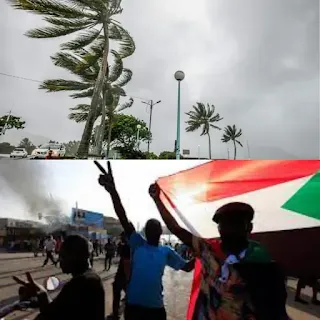Tropical cyclone Belal hits Reunion Island and Mauritius this Monday, January 15. Despite warnings, Reunion was spared by the cyclone, the eye of the storm passed further north.
Reunion authorities had raised the storm alert level to purple, the highest, fearing a cataclysm as the cyclone approached. This alert level even prohibited rescuers from leaving their shelter. The level was then lowered to red, which allowed the authorities to provide aid to those affected.
A first death was confirmed by the Reunion prefecture.
Another was recorded on Mauritius. In a few hours the streets of Port-Louis, the Mauritian capital, became torrents, carrying vehicles in their path, some residents were able to find refuge on the roofs while waiting for help.
Around a quarter of households in Mauritius are without electricity and thousands of people no longer have access to running water.
Mauritian authorities say the storm will pass south on Tuesday.
Mauritius was hit in February 2023 by heavy rains and strong winds from Cyclone Freddy, which had ravaged southeast Africa, including Malawi, Mozambique and Madagascar.
Sudan: obstacles on the path to peace
Since Monday, the war between the army and paramilitaries in Sudan has entered its ninth month with no end in sight.
The clashes continue, IGAD, the intergovernmental authority for development, announces the holding of an extraordinary summit on Thursday to try to put an end to this conflict.
However, the Sudanese government has already announced that it will not attend the meeting.
While millions of people now need humanitarian assistance to survive. The health system is in tatters, education in a comatose state.
“When the war broke out we were busy with our revisions because the compositions had to take place at the end of Ramadan like many other projects that I had in mind, but the war stopped everything,” says Habab Sharf Eldeen .
The end of the tunnel is not yet visible. The conflict is getting bogged down, throwing populations onto the roads. Since the start of the war, more than 7.3 million Sudanese have fled their country.
"We are affected by what happened in Khartoum and have affected us here. People displaced by the war have arrived, but we no longer have resources. Life is becoming more and more difficult as the war continues. continues,” explains Ayman Abdeen.
An ordeal forgotten by those involved in the crisis. The only thing that matters is the conquest of power in a country in difficulty. At least 1.3 million Sudanese have found refuge in Chad, South Sudan, Egypt, Ethiopia and the Central African Republic.

